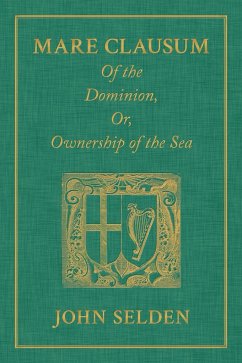
Mare Clausum. Of the Dominion, or, Ownership of the Sea. Two Books
In the First, is Shew'd that the Sea, by the Law of Nature, or Nations, is Not Common to All Men but Capable of Private Dominion or Proprietie as well as the Land in the Second, is Proved
Versandkostenfrei!
Versandfertig in 1-2 Wochen
64,99 €
inkl. MwSt.

PAYBACK Punkte
32 °P sammeln!
Originally published: London: William Du-Gard, 1652. [xlvi], 500, [10], 37 pp. Reprint of the first edition in English. Mare Clausum (Dominion of the Sea) is the most famous British reply to the argument of Grotius's Mare Liberum, which denied the validity of England's claim to the high seas south and east of England. John Selden [1584-1654] argued that England's jurisdiction extends, in fact, to all waters surrounding the isles. His use of common-law principles to rebut Grotius's philosophical argument is quite impressive. Holdsworth notes that his case was enriched by "a vast historical know...
Originally published: London: William Du-Gard, 1652. [xlvi], 500, [10], 37 pp. Reprint of the first edition in English. Mare Clausum (Dominion of the Sea) is the most famous British reply to the argument of Grotius's Mare Liberum, which denied the validity of England's claim to the high seas south and east of England. John Selden [1584-1654] argued that England's jurisdiction extends, in fact, to all waters surrounding the isles. His use of common-law principles to rebut Grotius's philosophical argument is quite impressive. Holdsworth notes that his case was enriched by "a vast historical knowledge, replete with references to the customs of peoples from the times of the Greeks to his time.": Holdsworth, A History of English Law V: 10-11.




